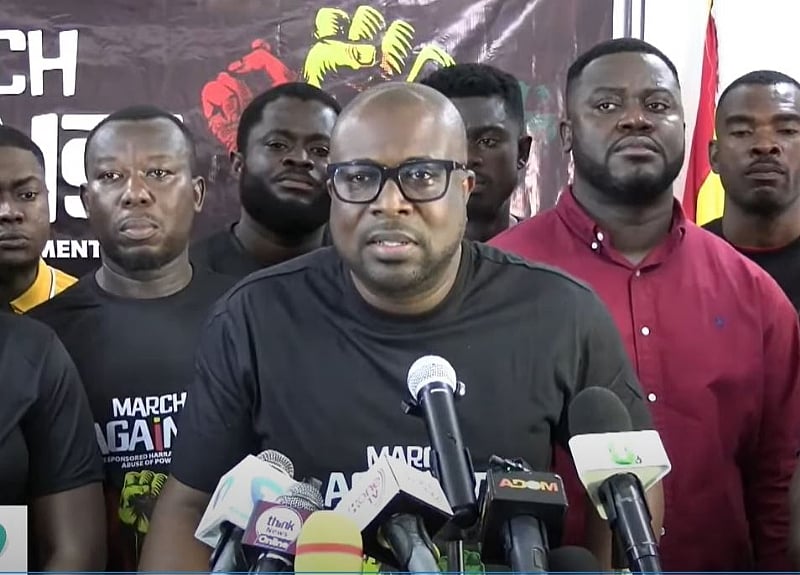Salam Mustapha, the National Youth Organiser of Ghana’s New Patriotic Party (NPP), has issued a fervent call to action, urging the nation’s youth to resist what he characterizes as a growing tide of selective justice and abuse of power orchestrated by the Mahama-led government. In a press conference held on Friday, September 19th, Mustapha accused the current administration and its associated security agencies of systematically targeting NPP members through politically motivated arrests, intimidation tactics, and a blatant disregard for due process. He painted a stark picture of opposition activists routinely subjected to unlawful detentions, violations of the constitutionally mandated 48-hour detention limit, and excessively harsh bail conditions, while individuals aligned with the ruling National Democratic Congress (NDC) seemingly operate with impunity, enjoying preferential treatment and escaping accountability for their actions.
Mustapha substantiated his claims by highlighting a series of recent incidents that he believes exemplify the government’s oppressive tendencies. Among these, he cited alleged threats directed at Minority Leader Alexander Afenyo-Markin and a physical assault on the NPP’s Third Vice Chairman, Alhaji Osman Masawudu, an attack he attributed to NDC Chief Awudu Sofo Azorka. These incidents, according to Mustapha, are not isolated events but rather symptomatic of a broader pattern of state-sponsored harassment designed to silence dissenting voices and suppress political opposition. He portrayed a nation teetering on the brink of authoritarianism, where the fundamental rights of citizens, particularly the youth, are being systematically eroded, leaving them unable to freely express their opinions or participate in the democratic process without fear of reprisal.
This perceived atmosphere of fear and intimidation, Mustapha argued, is antithetical to the spirit of a free and democratic society, and he implored the youth not to stand idly by while their rights are trampled upon. He framed the current situation as a critical juncture in Ghana’s history, a moment where the youth must choose between accepting a future of oppression or rising up to defend their freedoms and the principles of democracy. He warned against the dangers of complacency, arguing that allowing such abuses to go unchecked would embolden the government and further entrench its authoritarian tendencies, ultimately transforming the citizenry into “tenants” in their own country, stripped of their agency and reduced to a state of fear and subservience.
To counter this perceived threat, Mustapha issued a rallying cry for the youth to participate in a planned demonstration scheduled for Tuesday, September 23rd. He presented this demonstration not merely as a protest but as an act of defiance, a crucial step in resisting what he described as “creeping tyranny.” Participation, he argued, is not simply a matter of political activism but a civic duty, a necessary act of self-preservation to safeguard the future of Ghana and ensure the preservation of its democratic ideals. He urged the youth to demonstrate their collective abhorrence of the government’s alleged selectivity, injustice, and perversion of the rule of law, emphasizing that their collective action is essential for the safety and well-being of all Ghanaians and for the creation of a more just and equitable society.
The call to action carries significant implications, potentially shaping the political landscape of Ghana and influencing the balance of power between the ruling NDC and the opposition NPP. The success of the planned demonstration, both in terms of participation and its impact on the government’s actions, could serve as a barometer of public sentiment and potentially influence future political strategies. A strong showing of support for the NPP’s position could embolden the opposition and increase pressure on the Mahama-led administration to address the concerns raised by Mustapha. Conversely, a muted response could be interpreted as tacit acceptance of the status quo, potentially emboldening the government and further solidifying its control.
The situation in Ghana highlights the inherent tensions that can arise in a democratic society between the exercise of governmental power and the protection of individual rights. The allegations made by Mustapha, if proven true, raise serious concerns about the integrity of the democratic process and the potential for abuse of power. The response of the youth to his call for action will be a crucial factor in determining the trajectory of Ghana’s political future and the extent to which its democratic principles are upheld and protected. The world will be watching to see whether the youth heed Mustapha’s call and rise up to defend their rights or whether they succumb to the alleged pressures and become the “timid tenants” he warned against.


